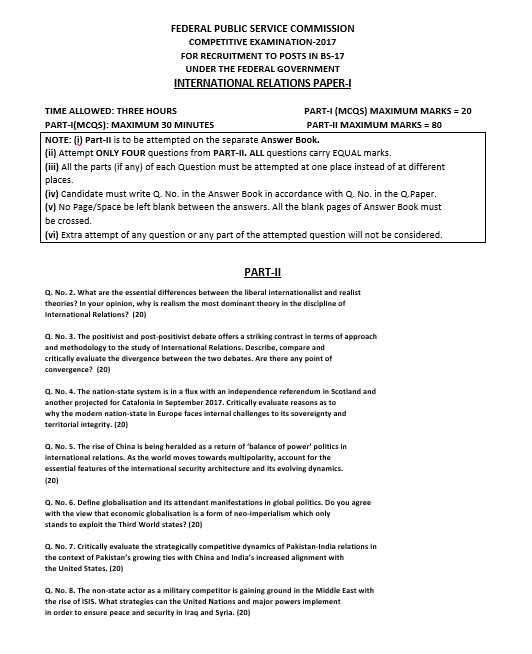CSS International Relations 2017 paper(a)
No. 2. What are the essential differences between the liberal internationalist and realist theories? In your opinion, why is realism the most dominant theory in the discipline of International Relations? (20)
No. 3. The positivist and post-positivist debate offers a striking contrast in terms of approach and methodology to the study of International Relations. Describe, compare, and critically evaluate the divergence between the two debates. Is there any point of convergence? (20)
No. 4. The nation-state system is in flux with an independence referendum in Scotland and another projected for Catalonia in September 2017. Critically evaluate reasons as to why the modern nation-state in Europe faces internal challenges to its sovereignty and territorial integrity. (20)
No. 5. The rise of China is being heralded as a return to ‘balance of power’ politics in international relations. As the world moves towards multipolarity, account for the essential features of the international security architecture and its evolving dynamics. (20)
No. 6. Define globalization and its attendant manifestations in global politics. Do you agree with the view that economic globalization is a form of neo-imperialism that only stands to exploit the Third World states? (20)
No. 7. Critically evaluate the strategically competitive dynamics of Pakistan-India relations in the context of Pakistan’s growing ties with China and India’s increased alignment with the United States. (20)
No. 8. The non-state actor as a military competitor is gaining ground in the Middle East with the rise of ISIS. What strategies can the United Nations and major powers implement in order to ensure peace and security in Iraq and Syria? (20)
Summary of Questions:
No. 2. What are the essential differences between the liberal internationalist and realist theories? In your opinion, why is realism the most dominant theory in the discipline of International Relations?
Liberal internationalism emphasizes cooperation, democracy, and international institutions to address global challenges. It believes that countries can work together for common goals, while realism focuses on power, national interest, and the inevitability of conflict. Realism is dominant because it reflects the competitive and anarchic nature of international relations, where states prioritize survival and power over cooperation.
No. 3. The positivist and post-positivist debate offers a striking contrast in terms of approach and methodology to the study of International Relations. Describe, compare, and critically evaluate the divergence between the two debates. Is there any point of convergence?
Positivism emphasizes empirical evidence, scientific methods, and objective analysis in studying international relations, while post-positivism challenges these ideas, arguing that knowledge is subjective and influenced by power structures. The two differ in methodology, but both can converge in acknowledging the influence of context and values in shaping political outcomes.
No. 4. The nation-state system is in flux with an independence referendum in Scotland and another projected for Catalonia in September 2017. Critically evaluate reasons as to why the modern nation-state in Europe faces internal challenges to its sovereignty and territorial integrity.
The modern nation-state in Europe faces internal challenges due to increasing regional nationalism, cultural identity movements, and dissatisfaction with central governments. The desire for greater autonomy and independence, driven by economic and political factors, is shaking the traditional boundaries of state sovereignty and territorial integrity.
No. 5. The rise of China is being heralded as a return to ‘balance of power’ politics in international relations. As the world moves towards multipolarity, account for the essential features of the international security architecture and its evolving dynamics.
As China rises, the global balance of power is shifting toward multipolarity, where multiple states share influence. This change affects international security by creating a more competitive environment, with new alliances and rivalries forming. The dynamics of international security are evolving to accommodate the rising influence of non-Western powers like China.
No. 6. Define globalization and its attendant manifestations in global politics. Do you agree with the view that economic globalization is a form of neo-imperialism that only stands to exploit the Third World states?
Globalization refers to the increasing interconnectedness of countries through trade, communication, and cultural exchange. It has led to both opportunities and challenges for global politics. Some argue that economic globalization exploits Third World states by reinforcing inequalities and fostering dependence on powerful economies, while others believe it brings growth and opportunity.
No. 7. Critically evaluate the strategically competitive dynamics of Pakistan-India relations in the context of Pakistan’s growing ties with China and India’s increased alignment with the United States.
Pakistan-India relations are shaped by historical conflicts, territorial disputes, and strategic competition. Pakistan’s growing ties with China and India’s alignment with the U.S. have intensified rivalries. These alliances influence the security dynamics in South Asia, contributing to a complex balance of power in the region.
No. 8. The non-state actor as a military competitor is gaining ground in the Middle East with the rise of ISIS. What strategies can the United Nations and major powers implement in order to ensure peace and security in Iraq and Syria?
The rise of ISIS has posed a significant threat in the Middle East, and non-state actors like ISIS are increasingly challenging state sovereignty. The United Nations and major powers can focus on military intervention, humanitarian aid, and diplomatic efforts to stabilize Iraq and Syria, while addressing the root causes of extremism and supporting regional security structures.
